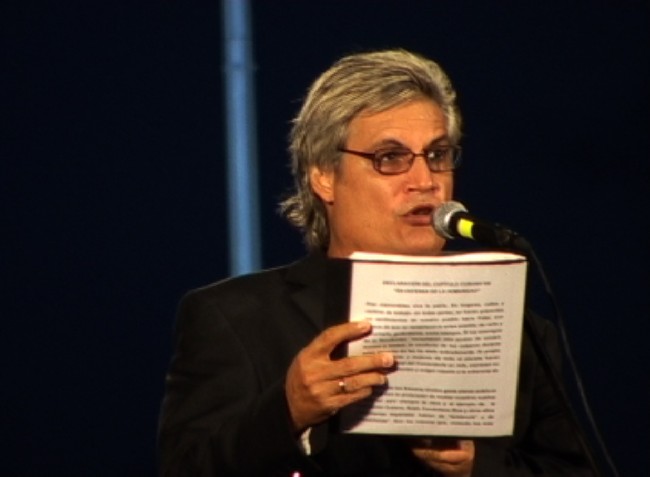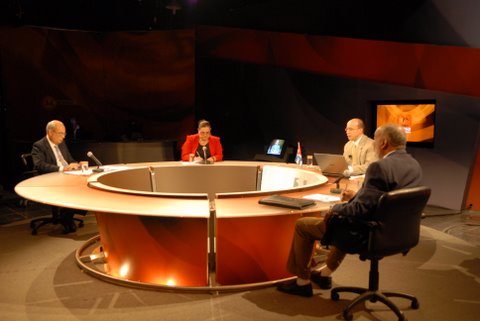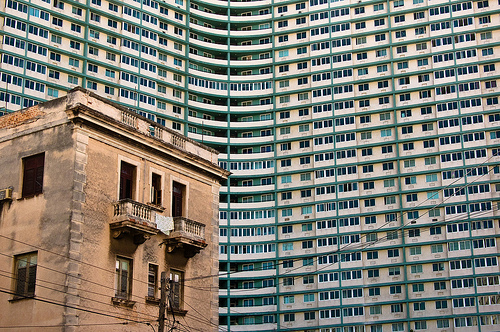
We’re used to the daily paper, Granma, emphasizing some news and omitting other. After all, it’s the official organ of the Communist Party. The party owns it and, therefore, decides what and how it reports. It’s difficult, however, to accept that the media is used to propagate a culture of fear and repression.
Looking for information about the reception of satellite signals and antennas in the Official Gazette of the Republic, a place where Cuban laws are published, I found one provision from the Executive Committee of the Council of Ministers, and two from the Ministry of Informatics and Communications (MIC) regulating the issue.
They are Resolutions 98 and 99 of the year 1995 and Decree No. 269 of the year 2000. These rules consider it a violation to import, make, sell, or install equipment, antennas, accessories and other receptor equipment for radio communications, among which are television signals. They also prohibit their distribution.
The legislation imposes administrative fines of one thousand dollars for individuals and from 10 thousand to 20 thousand dollars for companies. However, several newspaper articles in Granma reported to the public that the fines were 10 to 20 thousand dollars, without specifying. Amounts are applied at the discretion of the MIC Inspectors, whether to an individual or a company.
The most characteristic work in Granma was “Pirating Satellite Signals,” by Lourdes Perez Navarro, published in August of 2006. The journalist exposed the way in which the business of illegally distributing foreign television programs have developed inside the island, the national rules transgressed and the severe punishments.
According to the reporter, clients of the business of distribution of the foreign television signal receive an avalanche of commercial advertisement that shows a view into capitalism, anti Cuban messages and even pornography.
She even tapped the political-ideological issue. “In the case of Cuba, part of the programming is received in this way, content is destabilizing, interventionist, subversive, and calls, increasingly, to terrorist activities, ” she wrote.
Three years later, and through those crazy television signals, the Cubans saw how Amaury Pérez admitted that in Cuba “there is no freedom to have an antenna” and thousands of justifications for not having Internet access”
Can you imagine Amary Pérez saying “I have an antenna” in the Cuban television? as he did in the Univision program “Al punto” during a trip to Miami toward the end of 2009.
The composer/singer admitted to having brought it from Mexico. “I even had it when they were even bigger, not so small, at that time nobody had the antenna idea, but for me television is very important” he commented, Amaury didn’t say if he had authorization to enjoy that privilege. It is true that the program was seen in the island thanks to the reception of illegal signals.
In 2006, the Granma journalist claimed that “the spread of satellite programs technically known as multipoint distribution system by microwave,” was authorized as a limited telecommunications service.
In other words, in Cuba only specifically authorized distribution companies can distribute them, and they can only be enjoyed by the people approved by the MIC as a user. The journalist also omitted that the service is coded and was intended mainly for tourism and the diplomatic corps.
Lourdes Pérez Navarro, who regularly covers the section Laws Issues in the newspaper Granma, said that signal piracy “violates international regulations agreed for its use” and in its realization “a string of crimes and administrative violations are committed that warrant severe sentences under different laws and legal regulations.”
She explained in detail all the crimes involved around the issue. She began with smuggling, which provides penalties of up to 3 years imprisonment and fines between 15 thousand and 50 thousand dollars. According to the reporter, tourists and Cubans living abroad bring into the country signal receivers and memory cards, in violation of customs laws.
She said we have detected that another way to own antennas has been the removal of such equipment or accessories from persons authorized to hire the service, “In this case, she said, the “crime of robbery or burglary or receiving stolen merchandise by force was committed,” for those who acquired it on the illegal market.
She mentioned other crimes: the “illegal economic activities, by providing the service without a license, which is aggravated when using black market material. The “speculation or hoarding” by purchasing goods for resale and “damage”, when “electric and telephone poles are disabled or roads are broken to pass the wires.”
She also warned that administratively there were “heavy fines and confiscation for the transgressors.” “The spread of satellite programs requires a license issued by the agency of control and supervision of the Ministry of Informatics and Communications, an entity that has full authority inspectors to impose fines and confiscate equipment when violations are detected?
And she literally cited the violation under the articles of Decree-Law No 157 of 1995, another of the rules governing the matter, and records that the amount of fines to be imposed shall be determined by the minister. However, she misrepresented the information when she stated the figure for the amount of fines, as established by resolutions 98 and 99 of that ministry.
“A fine of 10 thousand to 20 thousand pesos in national currency or its equivalent at the official rate convertible currency will be imposed, as well as administrative measure the ancillary confiscation without compensation or payment,” Perez Navarro affirmed in her statement.
The same way she reported that “according to Decree Law No. 99, inspectors are empowered to raise the fine up to half of the maximum (10 thousand pesos more) for what it could impose financial penalties of up to 30,000 pesos.”
And she stressed that as for some, “illegal distribution of satellite television has become as unjust enrichment, ” these people are subject to the Decree Law 149 of 1994 and by confiscation are deprived of substantial assets “that do not correspond in relation to income and can not be justified.”
Lourdes Pérez Navarro completed her report by stating that “the work of persuasion of the masses” was essential “to eradicate this practice, while supporting the authorities responsible for enforcing those regulations against those who with absolute irresponsibility utterly violate the law.”
I was left with my mouth agape by that report. Deployment of standards that did not promote the observance of the law, but the culture of fear and repression among Cubans. Not one sentence devoted to denounce the MIC and its inspectors, for violating the law and defrauding the public. Nor did she mention that for those inspectors to do their job, they violate citizens’ homes, a constitutional right.
The official press has the power to know that, through information, dictating what is right or wrong. That to see, hear and read, and whom to obey. However, no one dares to question the politics of exclusion and repression that the government implements, in a supposedly socialist legality committed to serving the people.
Laritza Diversent, Cubanet
Translated by: Mari Mesa Contreras
April 28 2011






